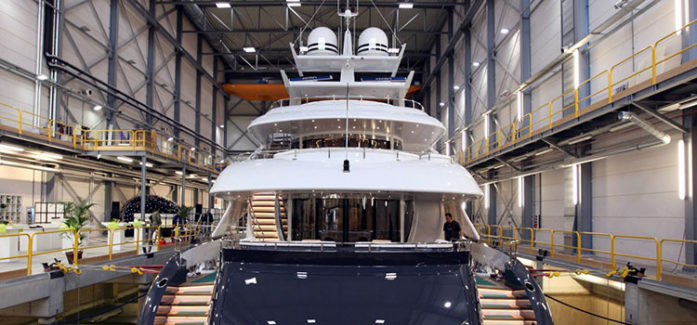Introduction
Yacht building contracts (as any other shipbuilding contracts) are complex transactions devised for the construction of a floating vessel (be it an oil tanker, a cargo ship, a yacht, or a superyacht) in a complex contractual framework.
In the industry, they rather use standard form contracts which will be amended at will by the parties. In those templates will be negotiated individual agreements. Shipyards will produce sometimes their own contracts just to reflect their individual policy and practice.

a yacht building yard
[source: various stock images]
Of course, the yacht builders are usually much smaller than the oil tanker builders so they will rather produce almost without exceptions their own form of contract. They are commonly presented to the buyers in a “take it or leave it” basis, or, in the cases of more complex projects, the yacht building contracts will be subject of negotiation and revision by the parties or their respective legal advisors.
In most cases, such yacht-building contracts will stipulate that they shall be governed by the law of the country in which the yacht will be built. In some instances a foreign yacht-builder may be prepared to agree that English law, or another legal system, will apply. The main legal implication of such an individualistic approach is that specialist case law (if any) must be used with extreme care, as it will be based on wording tailor-made for the individual project concerned.
In the yachting context difficulties may arise because the final agreement will invariably make reference to various external sources such as classification societies rules and regulations, flag state regulations such as the Large Yacht Code, or the Passenger Yacht Code, and the all-important technical specifications where the detailed regulatory requirements for the future yacht and her design are necessarily contained.
The nature of yacht building contracts
A yacht building contract is directed towards the regulation of a construction project involving the supply of workmanship and materials. The final product, the yacht, is a “future good” which will be sold conform the stipulated agreement and conditions provided by the contract.
Legally, there are only three yacht types considered: Production boats, custom-built boats, and semi-custom boats.
Generally, yachts with LOA under 24 meters are built of GRP (glass reinforced plastic), wood, or aluminum, and they are normally built as part of a series to a standard design, and possibly with optional features in much the same way as a luxury car. There are also many production yachts in excess of 24 meters (79 feet) in length and venturing into superyacht territory. Even that there isn’t a „legal” definition of a superyacht, it’s considered that a boat of 40 meters and over can be considered as such. It will be built of steel, aluminum, composite fiber, or a combination of the last two.

A superyacht on tests after building
At the high end of the spectrum, custom-built yachts are built for customers on a one-off basis, and are either designed in-house by the shipyard, or by a specialist architect employed directly by the owner. A semi-custom design is a halfway measure whereby a client opts for a standard production design, which is customized with a limited degree of original design work.
If the buyer appoints its own designer and then has the yacht built at a yard of its choice, then the contract with the yard will definitely have the nature of a purchase agreement. Whether the design element is an interconnected but separate professional service contract, which may attract terms implied by statute and/or the common law and survive termination or rescission of the building contract, will simply depend on the terms of the individual agreement concerned.
[Rescission is the act of officially ending a law, taking back a decision, or saying that an agreement no longer exists.]
[to be continued, stay tuned for part 2]
If you like what you read, please subscribe to this blog by completing the form. If you want to help more, start by following us on Twitter, and like our page on Facebook. You don’t know what good things may happen. To lighten your day, check our pins on Pinterest, we can be friends there too. Oh, and if you need a really good looking blog attached to your site, or just for fun, to express your feelings more competitively, read this Own Your Website offer! Thank you very much.
